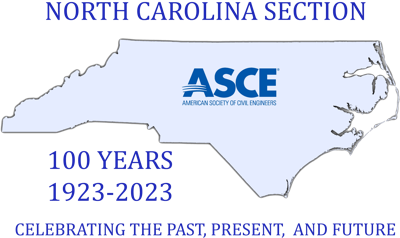Speaker: Kevin Carter, P.E.
Date: Thursday, November 17, 2016
Topic: Durham's 3,000,000 gallon Elevated Water Storage Tank
Presentation: Not available
Summary: Between 2008 and 2014, as part of the City of Durham's water distribution system Capital Improvements Program, the City's Department of Water Management completed the planning, site selection, hydraulic modeling, design, regulatory and environmental permitting, bidding, and construction of the very complex combination of a 3,000,000-gallon elevated water storage tank and 5 million gallon/day water booster pumping station to service three different water systems, all located in its base.
This would also be the first new elevated water storage tank built by the City of Durham in over 20 years, and was definitely going to be a giant. The tank site is located just east of the city at the intersection of Miami Boulevard and Angier Avenue.
In 2008, the city embarked on selecting a consultant for the project. As Vice President and Senior Project Manager for Kimley-Horn's Water Resources Department, Mr. Carter performed all the services required for this extremely rare and unique elevated water storage tank project.
The tank's planning necessitated significant coordination with multiple city departments, including the Durham City/County Planning Department, City of Durham Engineering Department, and the City of Durham Department of Water Management who was the actual the facilitating department for the project.
Unique requirements included an extensive geotechnical analysis to determine if the tank site would accommodate a tank of the proposed style and capacity, and if so, what type of foundation would be required.
The project's construction took almost two years to complete at a cost of approximately $6 million.
About Mr. Carter:
He is the President and CEO of K. F. Carter Engineering Company, PLLC located in Durham, North Carolina. He has over 38 years of experience in the planning, design, and construction of some of the largest and most complex civil engineering and utility infrastructure projects constructed anywhere in the Southeast.
Kevin has primarily served major municipalities such as the cities of Raleigh, Durham, Cary, Burlington, Greensboro, Asheville, Charlotte, Wilmington, Fayetteville, Columbia, Charleston, and Savannah, and local authorities such as OWASA and CFPUA.
Kevin received his BS in Civil Engineering from Virginia Tech in 1978, and immediately following graduation started his engineering career by moving to the very small, quaint, and rural bedroom community of Cary.
Kevin is a registered professional engineer in North Carolina, South Carolina, Georgia, and Virginia.



















